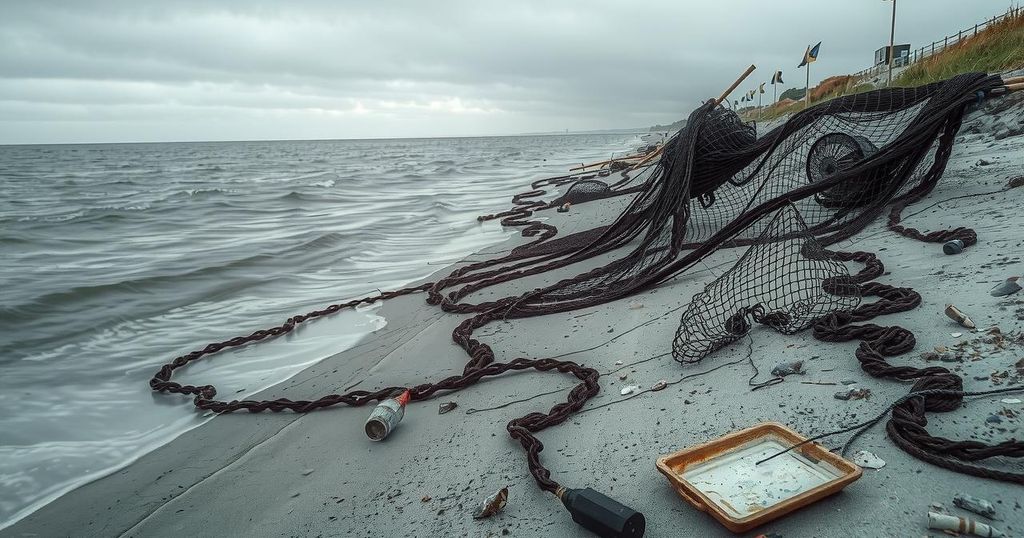Peruvian Fishers Seek Justice and Compensation Following Oil Spill Crisis

An oil spill at the New Talara Refinery in northern Peru on December 22, 2024, contaminated a 10-kilometer stretch of coastline, leading to a 90-day environmental emergency and disrupting the livelihoods of over 4,000 artisanal fishers. The fishers have deemed the compensation from Petroperú insufficient, prompting demands for additional support amid ongoing environmental challenges. Despite these claims, Petroperú asserts it has fulfilled its obligations.
On December 22, 2024, an oil spill occurred at the New Talara Refinery in northern Peru, contaminating a 10-kilometer (6-mile) stretch of the Pacific coastline. The Peruvian environment ministry responded within days by declaring a 90-day environmental emergency, severely impacting tourism and the livelihoods of over 4,000 artisanal fishers in the area. Following this event, the affected fishers have expressed dissatisfaction with the compensation provided by Petroperú, the state-owned oil company responsible for the spill, claiming it is insufficient despite Petroperú’s assertions that it has fulfilled its obligations.
The Dec. 22 spill was initially reported by Petroperú as a 0.9-barrel leak but later assessments revealed that the spilled volume was significantly higher, with recovery efforts indicating nine barrels of hazardous material had been managed after the release. The coastal areas impacted included La Capullana, El Anchón, La Palizada, and La Bola, which are crucial for local fisheries. Fishermen like Tulio Chapilliquen, who grew up witnessing similar environmental negligence, highlight the ongoing struggles with the oil industry’s prevalent impact on their working waters.
In response to the emergency, Petroperú undertook cleanup operations under the supervision of the regulatory agent OEFA. However, the situation worsened further when a strong tide caused significant damage to fishermen’s equipment and facilities during the Christmas season. Many fishers felt a compounded loss, as they were unable to work, and their livelihoods were further endangered by environmental degradation, a situation exacerbated by the COVID-19 pandemic’s lasting effects on the local economy.
Challenges faced by the fishers in Talara have been echoed in previous environmental disasters like the oil spill in Callao, which was reported to have left victims without adequate support or retraining options. Despite the smaller scale of the Talara spill, it similarly left many fishers dissatisfied with governmental responses and reliant on local community support to cope with the subsequent hardships.
Fishers have been vocal about their demands for better compensation, with the Talara Fishermen’s Guild advocating for daily payments during the emergency period and sufficient reparations for all those affected. However, Petroperú has offered limited aid, appearing to downplay the severity of the situation by providing minimal financial assistance to fishermen. The significant disparity in compensation between the oil company and the needs of affected individuals has spurred calls for legal action.
As of early February 2025, the fishers were back at sea but remained vigilant against new spills. Additional incidents of oil resurfacing have raised alarms among the community, prompting protests against Petroperú’s operations and oversight. OEFA has continued to monitor the situation; however, public discontent remains high due to the perceived inadequacies of the company’s responsive measures and the ongoing environmental repercussions felled by the oil industry.
In conclusion, the December 2024 oil spill in northern Peru has precipitated significant and ongoing challenges for local fishers, highlighting the inadequacy of the compensation provided by Petroperú. Despite the company’s claims of having met its commitments, affected individuals have reported dissatisfaction with the financial support given, prompting a push for further compensation through legal channels. The spill has not only harmed the environment but has also disrupted the livelihoods of thousands, leaving the fishing community to navigate the aftermath of this environmental disaster while grappling with systemic shortcomings in corporate accountability and state support.
Original Source: news.mongabay.com






